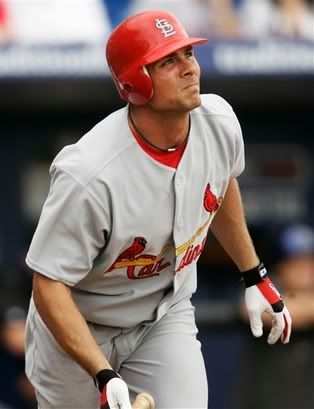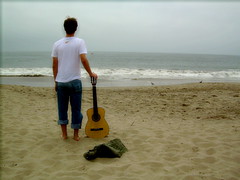
In the summer of 2000 my friend, Paul, and I attended a St. Louis Cardinals game against the Arizona Diamondbacks on a whim. When I lived closer to St. Louis these spontaneous trips occasionally happened. At the front ticket office, we splurged a little for some good seats behind home plate. It was a fun evening of baseball. I remember two things about that game. One was that the Diamondbacks went on a tear late in the game and turned it into a blowout. The other thing was Rick Ankiel and his pitching.
At that point he hadn't tied a record for wild pitches in an inning (one that hadn't been touched since 1890). For most of the game he was in command. We were amazed at the 20 year old's command. At some point he threw a wild pitch that hit the backstop. I recall laughing at it. Partly because I had jumped when the ball looked like it was coming at us.
By now most people know the story of how he collapsed that same year in the playoffs. One wild pitch after another his promising young career was being thrown away (pardon the pun). Attempted comebacks, more wild pitches, and then injuries derailed Ankiel. He had been one of the most promising young left-handed pitchers to enter the game. Now he was washed up. A mental wreck and no one knew how to stop his epic collapse.
He was sent back down to the minor leagues and in 2005 announced that he was giving up pitching forever. But the story doesn't end there. He decides he can play the outfield and can improve his hitting. Pitchers aren't supposed to hit, much less chase fly balls in the outfield. He was working an up hill battle. Last season he got the call back up to the major leagues. If you follow sports at all you know that in just three days he began taking baseball and the Cardinals by storm again. He homered three times, had many more hits, and was making some great plays in the outfield. The fans were giving him standing ovations nearly every time he came to the plate it seemed. Ankiel, even if it was just for a moment, had returned.
Charles Krauthammer, normally a political analyst, wrote an article on him in the Washington Post comparing him to The Natural. He writes, "His return after seven years -- if only three days long -- is the stuff of legend."
We now begin the 2008 season. It's still early, but two games in, Ankiel has already homered and is making great plays in the outfield. He's come into this season with high expectations. He's the starting center fielder, replacing a legend who's roamed the Cardinals outfield for years, in Jim Edmonds.
So is there a lesson here besides just a feel good story? A story that probably makes Hollywood producers drool. I think so. Here are three:
- Know When to Change Course - Ankiel could have continued to work on pitching. He could have tried to regain the command and control he once enjoyed. Stubbornly attempting to go back to the way he once was. Problem is, I think he would still be pitching in the minor leagues, or out of baseball altogether had he taken this path. Instead of stubbornly holding on to the past, he changed course. He set his re-aligned his goals and set a different path. How often could we stand to change course? How often do we sometimes insist on everything going back to the way it once was? Instead of stubbornly trying again and again to make something work, that just no longer works, maybe we should change course.
- Identify Your Talents - If you see you have a talent in something why not pursue it? We aren't all able to throw curve balls to get major league hitters out. Even Rick Ankiel figured this out. He had to identify his talents. It was still in his field of baseball, but different. When you find something you can do well, instead of spinning your wheels doing something else, pursue your talent. Life is too short trying everything else your not good at.
- Determine to Achieve Goals - Too often we get to the hard part in our goals we have set for ourselves and we get discouraged. It's easier to just quit. It's easier to walk away and set an easier course of action. Usually one that achieves nothing. I suspect for Ankiel, the hard part of his goal of becoming a power hitting outfielder was when he was traveling around to second rate cities in the minor leagues. It would have been easier for him to demand immediate rewards. After all, he once pitched in the major leagues! He started Game 1 of the 2000 Divisional Playoffs! It probably wasn't easy while chasing down fly balls in AA ball in Springfield, MO, but he remained determined to achieve his goal. It was going to take some time, and he was prepared to work through the hard part.















No comments:
Post a Comment